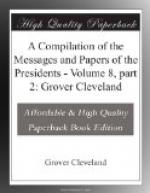In the matter of compensation, it is provided that claims may be presented within ninety days from the passage of the act, “but not thereafter;” and there is no saving for minors, femes covert, insane or absent persons. I presume this is an omission by mere oversight, and I recommend that it be supplied by an amendatory or supplemental act.
ABRAHAM LINCOLN.
WASHINGTON, April 18, 1862.
To the Senate and House of Representatives:
I transmit to Congress a copy of a correspondence between the Secretary of State and Benjamin E. Brewster, of Philadelphia, relative to the arrest in that city of Simon Cameron, late Secretary of War, at the suit of Pierce Butler, for trespass vi et armis, assault and battery, and false imprisonment.
ABRAHAM LINCOLN.
EXECUTIVE MANSION,
Washington, April 24, 1862.
To the Senate of the United States:
In obedience to your resolution of the 17th instant, I herewith communicate the testimony and judgment of the recent naval court of inquiry in the case of Lieutenant Charles E. Fleming, of the United States Navy; also the testimony and finding of the naval retiring board in the case of the said Lieutenant Fleming.
I have the honor to state that the judgment and finding aforesaid have not been approved by me.
ABRAHAM LINCOLN.
WASHINGTON, April 26, 1862.
To the House of Representatives:
In compliance with the resolution of the House of Representatives of the 24th of February last, requesting information in regard to insurgent privateers in foreign ports, I transmit a report from the Secretary of State and the documents by which it was accompanied.
ABRAHAM LINCOLN.
EXECUTIVE MANSION,
Washington, May 1, 1862.
To the Senate of the United States:
In answer to the resolution of the Senate in relation to Brigadier-General Stone, I have the honor to state that he was arrested and imprisoned under my general authority, and upon evidence which, whether he be guilty or innocent, required, as appears to me, such proceedings to be had against him for the public safety. I deem it incompatible with the public interest, as also, perhaps, unjust to General Stone, to make a more particular statement of the evidence.
He has not been tried because in the state of military operations at the time of his arrest and since the officers to constitute a court-martial and for witnesses could not be withdrawn from duty without serious injury to the service. He will be allowed a trial without any unnecessary delay, the charges and specifications will be furnished him in due season, and every facility for his defense will be afforded him by the War Department.




